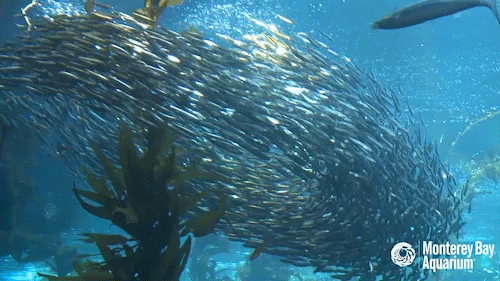I was on my walk today, and a decent metaphor explaining political behavior came to the surface: a school of fish.
I think I was imagining myself standing in a cold stream being mocked by trout, but that morphed into a school of fish.

The underlying psychology of this is how influential others behavior is on our own. We all remember peer pressure, but somehow when we become adults, we seem to believe we have outgrown the phenomenon.
We have not.
Whomever we define as “our peers” has profound effects on our behavior – especially our political behavior.
People in our friend groups, our co-workers, our fellow parishioners – all provide constant cues that influence our behavior. We implicitly understand that going against those cues will likely bring censure or exclusion. Censure we are smacked across the face by a tail, exclusion we are ejected into the sea.
Simply, social influence or peer pressure is one of the significant drivers of our behavior.
It is also why bots are effective at spreading bullshit, but that is a different post.
Once we define our groups, the small, constant cues tell us which way the group(s) are going.
There is safety in the group, and there is laziness in the group. I’ll not stray from the school and just draft on the work of others. Exactly like a school of fish.
I did read years ago a dense book by Nobel Prize winner Thomas C. Schelling, Micromotives and Macrobehavior. It explores in an academic, dense way how small meaningless decisions and actions by individuals (micro-behaviors) often lead to significant unintended consequences for a large group (macro-behaviors). One example he uses is white flight from neighborhoods. I won’t recommend the read because it is a slug, but here is a good summary. It is a work that Malcolm Gladwell made accessible in Tipping Point.
Elected Officials Behavior
I had an earlier question about the behavior of elected officials, but I want to state that they are not immune from peer pressure. In fact, they may be even more attuned to it, but there is a catch: their school is likely to have a lead fish.
Many elected bodies are organized in a hierarchical top-down fashion. The Speaker, Senate President, Mayor – often are “guiding” these schools with an iron fin (terrible pun!). Step out of the wake, and a politician is often left to fend for themself.
BUT – that isn’t the ONLY fish in their schools that they are swimming in. There are donors, activists, associations, lobbyists, voters, co-workers, media, social media followers, etc – all providing cues and constant feedback.
Conclusion
If one wants to affect change in this fractured world where nothing is important – and yet everything is important, one must think of the macro-outcome – likely a policy outcome – as a series of almost infinite multitudes of mini-interactions.
Each little fish must emit a small cue towards the process.
If everyone does that, and a “head fish” doesn’t pick up on those cues – well they can be the one out by themselves. That is the nature of schools.
